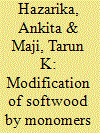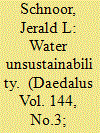| Srl | Item |
| 1 |
ID:
130735


|
|
|
|
|
| Publication |
2014.
|
| Summary/Abstract |
Technological development of wood polymer composites (WPC) is a very promising approach to overcome most of the disadvantageous properties of wood products, for example their poor mechanical strength, poor dimensional stability, susceptibility to fungal attack, weathering and the like. To find the substitute for costly items of hard wood, suitable technologies have been developed to modify softwood to meet specific end-use requirements. Various vinyl monomers and/or copolymers or thermosetting resin in combination with different types of cross linking agents, flame retarding agents have been used to improve the properties of wood. Nanotechnology is a new area of science and technology which opens up new opportunities to develop wood based products with desired properties. Now-a-days government is making strict legislations to promote green technology for the protection of environment world wide. With the depletion of petroleum resources at alarming rate, it is high time to replace petroleum-based products by some sustainable alternative products based on vegetable biomass. The bio-based resins obtained from renewable feedstock have been widely utilized by taking the advantages of easy availability, renewable nature and low cost. The green route of modification of wood is widely encouraged. With the progress of technological development, now it is possible to avoid the hazardous influence of organic solvents by using water as solvent or diluents formodification of wood. WPC has got tremendous scope for use in diverse areas of applications.
|
|
|
|
|
|
|
|
|
|
|
|
|
|
|
|
| 2 |
ID:
139819


|
|
|
|
|
| Summary/Abstract |
Water is a vital renewable resource that is increasingly stressed by multiple and competing demands from people, industry, and agriculture. When water becomes unavailable or unusable, life itself cannot be sustained. Changes in supply and demand for water are driven by population growth, climate change, and our energy and land use choices. Poverty frequently precludes the ability of many people to respond and adapt to water insecurity. In this essay, we discuss the effects of these drivers on the diminution of rivers, aquifers, glaciers, and the severe pollution that renders some water resources unusable. While technologies for water reuse, desalination, aquifer replenishment, and better water pricing are important solutions, the recognition of water as a profoundly threatened resource and as a basic human right is essential for providing sustainable water for future generations.
|
|
|
|
|
|
|
|
|
|
|
|
|
|
|
|